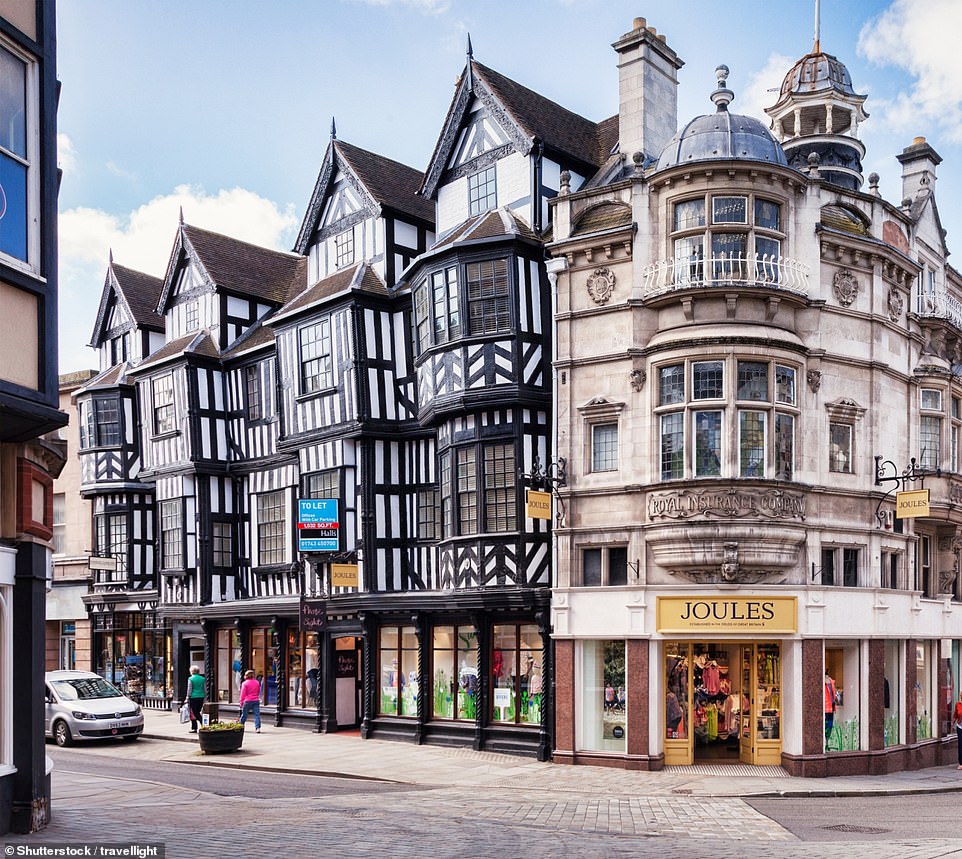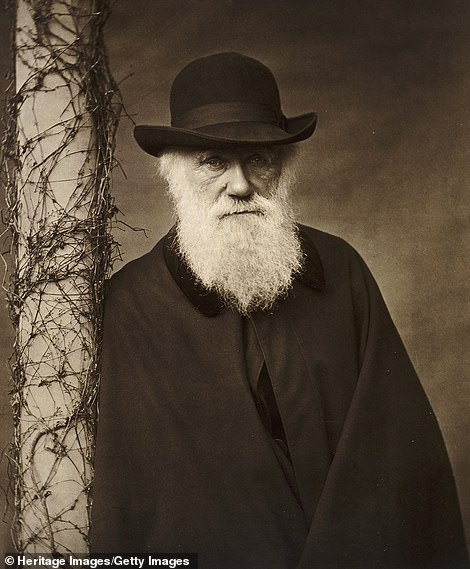Charles Darwin was a Shropshire lad at heart. He’s certainly Shrewsbury’s most famous son — which is why the Darwin Shrewsbury Festival is held annually to mark his birthday on February 12.
This year’s jolly, from February 9-17, will be a virtual affair but it should whet your appetite for visiting this fascinating town with its half-timbered buildings, medieval city walls and Grade II-listed English Bridge, which spans the River Severn.
Just in case you need reminding, Darwin’s 1859 book, On The Origin Of Species, forms the basis of our understanding of evolution, and much of his inspiration drew on his experiences of the great outdoors as a boy.

Origin of Darwin: The naturalist was born in 1809 at The Mount family home, on the fringe of Shrewsbury’s Quarry Park. Pictured is the town’s English Bridge
Down House, Darwin’s Kent home, is well-known. But his lesser-visited childhood haunts reveal a human side to the man behind the stern black-and-white photographs. That’s what I glean from a Darwin walking tour. ‘Darwin attracted more criticism than any other scientist, but he simply saw life with more clarity than most of us,’ says festival organiser Jon King.
The tour starts at Morris Hall, the public meeting space with the granite Bellstone (a glacial boulder) in its courtyard — a symbol of Shropshire’s unique geology.
Darwin was born in 1809 at The Mount family home, on the fringe of the town’s Quarry Park, and explored the geological features in the fields behind his house.

The medieval passageways (known locally as shuts) and cobbled streets of the town centre are home to intriguing independent boutiques and cosy coffee shops

Charles Darwin, who changed our view of the world
We move onto St Chad’s Church, where Darwin was baptised, and stroll past the town’s historic Market Hall, today the centre of Shrewsbury’s independent food scene, to the Unitarian Church he attended with his mother (whose father was Josiah Wedgwood of the pottery empire fame).
Darwin boarded at Shrewsbury School from 1818. The small square in front of the original school building is home to a statue of him — but he sits with his back to the entrance. He did not much care for his schooldays. Indeed, his teachers branded him ‘an average student’.
There’s nothing average about Shrewsbury, however. Today, the medieval passageways (known locally as shuts) and cobbled streets of the town centre are home to intriguing independent boutiques and cosy coffee shops. We pass the Shrewsbury Museum & Art Gallery, which houses some of Darwin’s early geological finds, and the Lion Hotel, where the young Darwin took a stagecoach to London to plead for his place on expedition ship The Beagle in 1831.
Most intriguing of all is the story of the 13th-century Traitor’s Gate, in the walls on the eastern side of town. When Parliamentarian troops approached Shrewsbury in 1645 during the English Civil War, seeking to put Royalist enclaves to the torch, it is believed a spy in the camp deliberately left the gate open for them. The town was taken without a shot being fired — bad news for Charles I, but a victory for historic building preservation.
My guided tour ends under Darwin’s Gate, a public art installation with three seemingly free-standing columns symbolising the three key influences of his formative years: the local geology, his religious views and his early study of scientific classification.
Darwin went on to travel the world on study trips, but he always cherished his Shrewsbury childhood. Standing in the park on a winter-sun afternoon, it’s easy to see why. As Darwin put it: ‘There is grandeur in this view of life.’
TRAVEL FACTS
Darwin’s Townhouse B&B has doubles from £90 per night (darwinstownhouse.com). The Darwin tour costs £7.50pp, meeting at the tourist office. Darwin Shrewsbury Festival will be held online from Feb 9 to 17 at darwin.originalshrewsbury.co.uk.
Advertisement
Source link : https://www.dailymail.co.uk/travel/escape/article-9229539/Britain-best-Charles-Darwins-home-town-Shrewsbury-undergone-glorious-evolution.html












